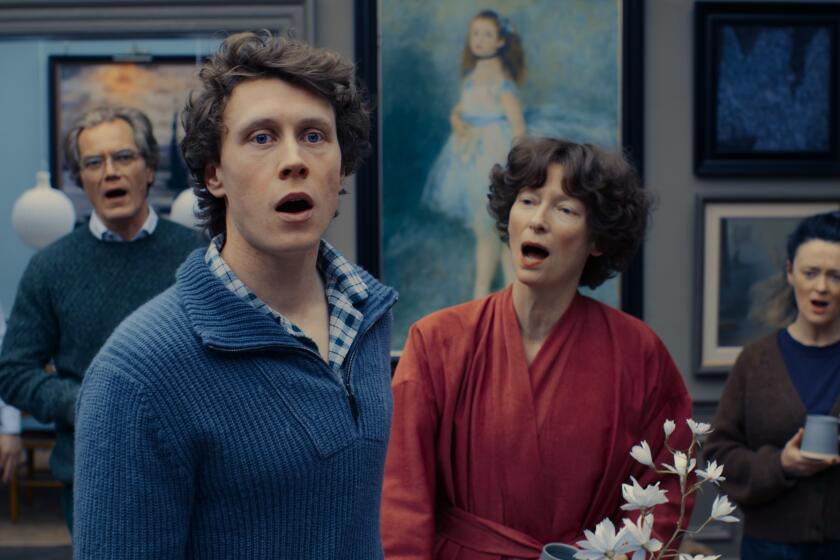‘Time’ Exquisitely Evokes Proust’s Changing World
- Share via
Raul Ruiz, the audacious Chilean director who has long lived in France, has pulledoff his most ambitious coup yet: a mesmerizing, shimmering and amazingly successful adaptation of
“Time Regained,” the final two volumes in Marcel Proust’s monumental “Remembrance of Things Past.”
An exquisitely wrought period piece of remarkable timelessness, it is a multilayered accomplishment that does not require viewers to have read Proust, though surely it is more accessible to those who have.
The best way to approach the film is simply to allow it to wash over you; key relationships within Proust’s substantial dramatis personae gradually become clear. It’s not necessary to sort out the connections between everyone because Proust’s implicit point is that, in the rarefied high society that was his universe, everyone was connected to everyone else one way or another.
Ruiz’s “Time Regained” manages to be a lot of things all at once. It is a depiction of an old world giving way to the new as France is ravaged by World War I, and by extension a depiction of 19th century literature yielding to the introspective modern novel. It is a portrait of an artist in the process of discovering that he can transform the life of his imagination into a work of art.
Proust’s subject was the eternal human comedy, and Ruiz and his co-adapter view it through the memories of the asthmatic Proust (Marcello Mazzarella) as he lies dying, nearing the completion of “Time Regained,” his recollections triggered by a collection of old photographs. True paradises, Proust concludes, are those that have been lost, to be recalled only in memory.
*
What is crucial and inspired here is that what Proust is shown to be remembering, apart from interspersed intervals in his childhood and on his deathbed, are not the real-life events and individuals that formed the bases of his writings but the characters and incidents they inspired. In short, Proust is comforted, touched, amused and moved by what his imagination has wrought, just as we are.
This glittering world in which Proust moved so easily, as above all an observer but also a trusted confidant and advisor, has been brought to dazzling life by Ruiz in all its elegance and luxury.
It is the world of privilege and status, of gala parties and concerts and dinners and seaside vacations--a world preserved in part by the late prodigious photographer Jacques Lartigue. It is a world of sexual intrigue and social ambition and, beneath a veneer of wit and manners, it possesses a great deal more mobility than you might imagine, for all its ancient titles and formality. Beautiful women and handsome men make breathtaking progress on their looks and sexual availability.
Indeed, it was the enchanting mistress of his own uncle who captivated him and helped spark his interest in the workings of high society. She would become in “Time Regained,” book and film, the agelessly ravishing Odette (Catherine Deneuve).
Her daughter Gilberte (Emmanuelle Beart) marries fashionably but unhappily to the handsome Marquis Robert de Saint-Loup (Pascal Greggory). He takes lush actress-demimondaine Rachel (Elsa Zylberstein) as a mistress and, as another lover, Morel (Vincent Perez), an aspiring concert pianist who had first been the protege of Saint-Loup’s kinky uncle, Baron de Charlus (John Malkovich, with hair and a fine command of French).
*
One of the important achievements of Ruiz, who moves effortlessly between past and present, memory and imagination, is to depict subtly the ever so gradual intrusion of war on the privileged. The initial responses are flip and shallow, but Saint-Loup proves a noble hero in battle, as does Morel, who redeems himself after a period of scandalous desertion.
Cinematographer Ricardo Aronovich brings to glowing life a past flawlessly and richly re-created by production designer Bruno Beauge and by costume designers Gabriella Pescucci and Caroline de Vivaise, whose clothes are often the key indicators of the time in which a sequence is set.
Jorge Arriagada’s score is as evocative as it is elegant.
As Proust’s health fails, someone, partially overhearing gossip, asks for clarification: Is it Proust’s life or novel that is over? Informed that he has completed “Remembrance of Things Past” at last but lives still, the inquirer remarks, “What then does he have to live for?”
What indeed: The man for whom his life became his work died seven months later at 51 on Nov. 18, 1922.
* Unrated. Times guidelines: adult themes and situations, discreetly presented.
‘Time Regained’
(Le Temps Retrouve)
Catherine Deneuve: Odette de Crecy
Emmanuelle Beart: Gilberte de Saint-Loup,
Odette’s daughter by Charles Swann
Vincent Perez: Charles Morel
John Malkovich: Baron de Charlus
Pascal Greggory: Marquis Robert de Saint-Loup, husband of Odette and nephew of Charlus
Marie-France Pisier: Madame Verdurin
Marcello Mazzarella: The Narrator (Marcel Proust)
Patrice Chereau: The Voice of Marcel Proust
A Kino International release of a Franco-Italian co-production: Gemini Films/France 2 Cinema/Les Films du Lendemain/Blu Cinematografica production in association with Madragoa Films with the participation of Canal Plus. Director Raul Ruiz. Producer Paulo Branco. Screenplay Gilles Taurand, Ruiz; based on “Time Regained,” the final two volumes of “Remembrance of Things Past.” Cinematographer Ricardo Aronovich. Editor Denise de Casabianca. Music Jorge Arriagada. Costumes Gabriella Pescucci, Caroline de Vivaise. Production designer Bruno Beauge. Art director Jim Donahue. Set decorator Rona De Angelo. In French, with English subtitles. Running time: 2 hours, 45 minutes.
Exclusively at the Royal, 11523 Santa Monica Blvd., West Los Angeles, (310) 394-9741; the Colorado, 2588 E. Colorado Blvd., Pasadena, (626) 796-9704; and South Coast Village, 1561 Sunflower Ave., Santa Ana, (714) 540-0594.
More to Read
Only good movies
Get the Indie Focus newsletter, Mark Olsen's weekly guide to the world of cinema.
You may occasionally receive promotional content from the Los Angeles Times.










